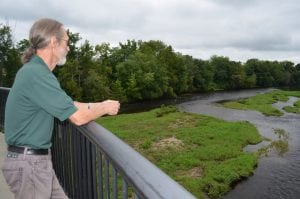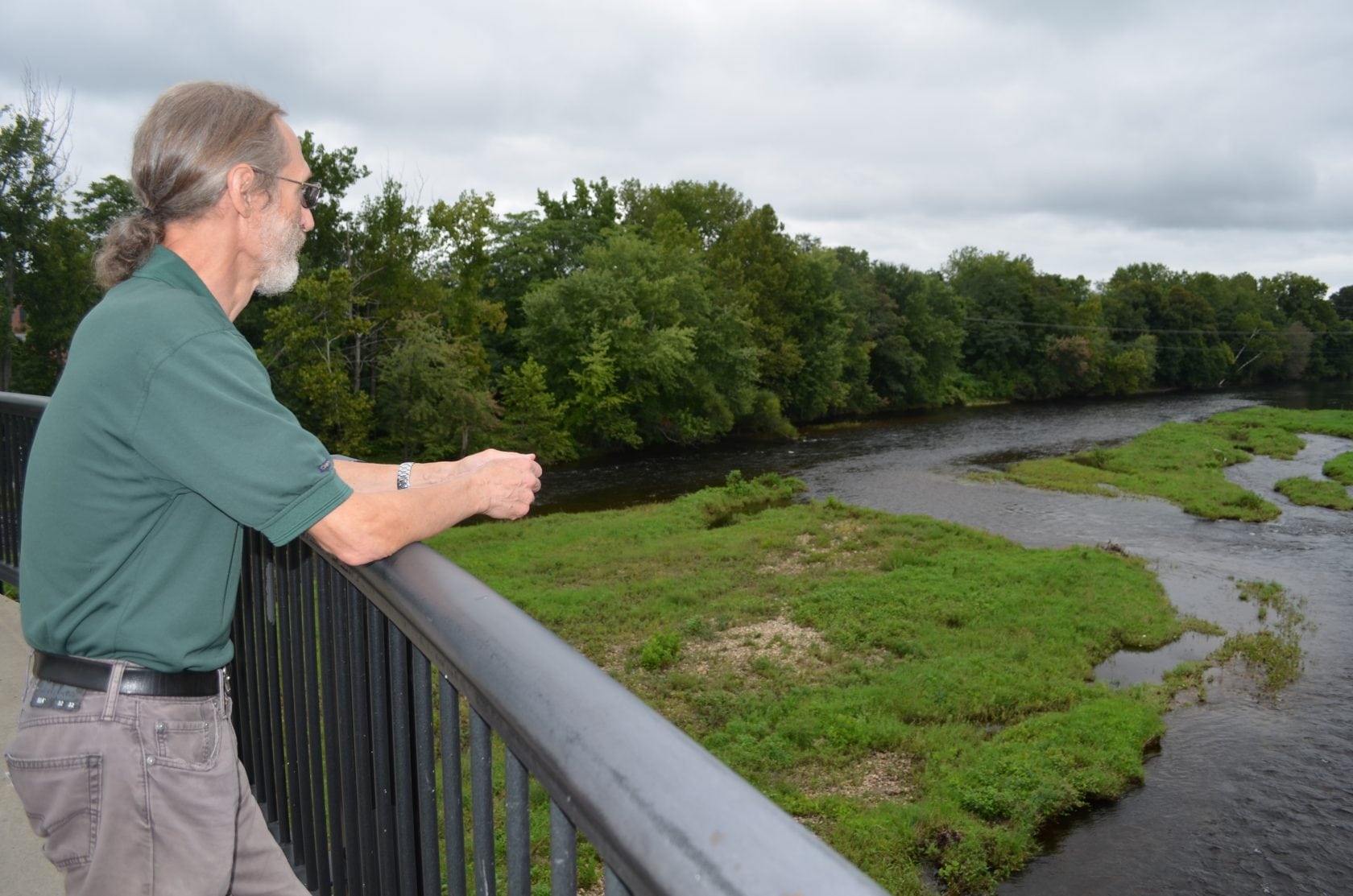WESTFIELD-The Westfield River needs some tender loving care – and volunteers who are willing to get dirty for a morning are being recruited for the clean-up effort.
Members of the Westfield River Watershed Association (WRWA), along with volunteers, will descend on two locations on the morning of Sept. 29 to form teams that will be given instructions on where to collect trash along the river’s banks.

Mark Damon is coordinating logistics for a river clean-up event on Sept. 29. One of the areas he is scouting is off Meadow Street in Westfield.
Mark Damon, an adjunct biology professor at Westfield State University and Holyoke Community College, will be leading the teams in Westfield. Damon is a WRWA board member and serves as its secretary.
“Wear clothing that can get dirty and wet,” said Damon, as he took a few moments to scout the banks of the Westfield River along Elm Street on Friday afternoon. For the past few weeks Damon has made numerous trips from Huntington to West Springfield, determining the most pressing areas that need attention.
“I have at least 20 sites that require clean-up efforts, however, I will have to prioritize what areas are in the most need,” said Damon.
Persons interested in volunteering from 9 a.m. to 1 p.m. are asked to meet Damon no later than 9 a.m. in the public parking lot at the end of Meadow Street where it meets Elm St.. The WRWA is also seeking volunteers living in the Agawam area to also meet at 9 a.m. at Pynchon Point at the end of South End Bridge Circle on River Road. Sheryl Becker will lead the teams at the Agawam site.
Damon noted that the WRWA sponsors river clean-up events in the spring and fall. During the spring clean up in Westfield, he said close to 20 30-gallon trash bags were filled with trash.
“In the past we have retrieved a variety of unusual items from the river, from a mannequin and air rifle to tires, furniture and kitchen appliances,” said Damon.
The majority of trash that is collected includes bottles and cans, discarded trash bags, and diapers.
“During our orientation at 9 a.m. we discuss precautions to take when retrieving items,” said Damon, noting that coming in contact with poison ivy is a particular hazard.
“We encourage everyone to wear boots if possible, long sleeve shirts and pants, and a hat for protection from the sun,” said Damon.
Participants are also encouraged to wear sunscreen and bring water to stay hydrated.
“We provide work gloves, however, we encourage those who have gloves to bring them,” he added.
Damon’s hope is that close to 40 area residents turn out for the river clean-up day.
“We encourage individuals to participate because the health of the ecosystem affects all of us,” said Damon, adding that the river is also a “major recreational resource” for the local communities.
“Westfield and the surrounding communities are built around our waterways and for Westfield itself, the river runs right through near the center of town,” said Damon. “It’s a source of beauty and inspiration, and a wonderful recreational resource.”
During future clean-up days, Damon hopes there are more volunteers who can also help with pulling up Japanese knot weed and the Bittersweet plant, both invasive species that are widespread along the Westfield River.
“It can take years to eradicate the growth of these plants,” said Damon, noting that these particular species crowd out native plants.
For more information on volunteering, contact Damon at (413) 977-1577 or via email to [email protected], or Becker at (413) 374-1921 or via email to [email protected].
“The air we breathe, the water we drink, the food we eat, the medicines with which we treat disease – all of these depend on a healthy, functioning planet,” said Damon. “When we protect a river, we do right by the other species sharing the earth with us, but we also are preserving our own lives and those of our posterity, because we are not separate from this world, no matter how much it may seen we are, but part of it, and the waters are its lifeblood.”
Damon added that a river clean up is “one small step” toward preserving the ecosystems on which all life depends.






